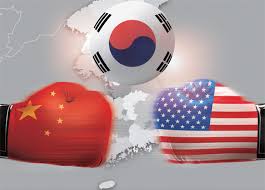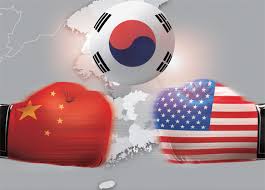
It was just a week ago that the Chinese tech giant Huawei was placed in its trade blacklist by the United States – but that did not stop a delegation of more than a hundred politicians and business leaders from South Korean visiting the company’s headquarters in China.
The team, which comprised of representatives from South Korean companies such as Samsung Electronics, was witness to the use of high-speed robotics by Huawei and simulation of future smart cities powered by the next-generation 5G network equipment from Chinese tech giant. This visit was ostensibly aimed at strengthening the tech relationship between China and Asia’s fourth-largest economy. The delegation was also reportedly backed by the South Korean government.
However that visit was clouded by the decision earlier this month of the United States government to prevent all American tech and telecom companies form doing any business or technological transactions with Huawei. The US is also trying to convince its western allies to also follow the same path of retribution against Huawei.
However this tirade against Huawie and the broader US-China trade war has put South Korea in a tight spot which finds itself caught between the politics of the two countries. For South Korea, both the United States and China assume equal importance because the US is Seoul’s critical security partner while China is the largest trading partner.
While business ties with Huawaei is being suspended by key global tech companies, but South Korean business executives and politicians claim that there are limited options to doing business with China as normal.
For example, according to experts, South Korean tech giant Samsung would make some business gains because of the US ban on Huawie but those gains would be offset by the issues of business loss for Samsung. While Samsung has the opportunity to acquire Huawei’s smartphone customers, it also stands to lose business because the Chinese company is also one of the largest purchasers of Samsung made memory chips.
“They (Huaiwe and Samsung) compete, but they are important partners too,” said Min Byung-doo, a South Korean ruling Democratic Party member of parliament who was part of the tour. He said that South Korean companies had “no simple alternative” to replace their business that they have with Huawei.
There has been no comments from Samsung.
In the long run, there would be a multiple concerns, say South Korean government officials and tech company executives. Compared to the 12 per cent of total exports South Korea does to the United States, its exports to China accounts for 26.8 per cent of the total exports according to 2018 figures.
There are some experts and analysts who are of the opinion that an intensification of the trade war between China and the US means that South Korea will ultimately have to choose a side.
“South Korea has to face the moment of truth - choosing the United States or China,” said Han Suk-hee, a professor of Chinese studies at Yonsei University and a former South Korean consul general in Shanghai.
“What if the U.S. is not only asking not to use Huawei products but also not to export South Korean semiconductors to China? The government needs to prepare for that worst-case scenario.”
(Source:www.reuters.com)
The team, which comprised of representatives from South Korean companies such as Samsung Electronics, was witness to the use of high-speed robotics by Huawei and simulation of future smart cities powered by the next-generation 5G network equipment from Chinese tech giant. This visit was ostensibly aimed at strengthening the tech relationship between China and Asia’s fourth-largest economy. The delegation was also reportedly backed by the South Korean government.
However that visit was clouded by the decision earlier this month of the United States government to prevent all American tech and telecom companies form doing any business or technological transactions with Huawei. The US is also trying to convince its western allies to also follow the same path of retribution against Huawei.
However this tirade against Huawie and the broader US-China trade war has put South Korea in a tight spot which finds itself caught between the politics of the two countries. For South Korea, both the United States and China assume equal importance because the US is Seoul’s critical security partner while China is the largest trading partner.
While business ties with Huawaei is being suspended by key global tech companies, but South Korean business executives and politicians claim that there are limited options to doing business with China as normal.
For example, according to experts, South Korean tech giant Samsung would make some business gains because of the US ban on Huawie but those gains would be offset by the issues of business loss for Samsung. While Samsung has the opportunity to acquire Huawei’s smartphone customers, it also stands to lose business because the Chinese company is also one of the largest purchasers of Samsung made memory chips.
“They (Huaiwe and Samsung) compete, but they are important partners too,” said Min Byung-doo, a South Korean ruling Democratic Party member of parliament who was part of the tour. He said that South Korean companies had “no simple alternative” to replace their business that they have with Huawei.
There has been no comments from Samsung.
In the long run, there would be a multiple concerns, say South Korean government officials and tech company executives. Compared to the 12 per cent of total exports South Korea does to the United States, its exports to China accounts for 26.8 per cent of the total exports according to 2018 figures.
There are some experts and analysts who are of the opinion that an intensification of the trade war between China and the US means that South Korea will ultimately have to choose a side.
“South Korea has to face the moment of truth - choosing the United States or China,” said Han Suk-hee, a professor of Chinese studies at Yonsei University and a former South Korean consul general in Shanghai.
“What if the U.S. is not only asking not to use Huawei products but also not to export South Korean semiconductors to China? The government needs to prepare for that worst-case scenario.”
(Source:www.reuters.com)





